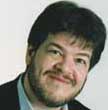
Jeff Jacoby
Clark's credibility gap
http://www.NewsAndOpinion.com | Wesley Clark, the four-star general who commanded US forces in Europe during the Kosovo war, is running for president as an opponent of the war in Iraq. So what will he say, a questioner asks, when the Bush camp levels the obvious criticism: If General Clark had his way, Saddam Hussein would still be in power.
"If General Clark had his way," the candidate instantly replies, "we'd have had Osama bin Laden dead or alive two years
ago, and the world would have been a lot safer. And then we'd have used the United Nations to go after Saddam Hussein the
right way."
Coming from one of the other Democratic candidates, that might be dismissed as empty rhetoric. But Clark has had
extensive experience in the Balkans and ought to know something about capturing international war criminals. After all, the
two most-wanted men in the world before Sept. 11, 2001, were Radovan Karadzic, the former president of the Bosnian
Serbs, and Ratko Mladic, the head of the Bosnian Serb army. They are widely considered responsible for the worst atrocities
in Europe since World War II, including the bloody "ethnic cleansing" of Bosnia and Croatia, the murderous siege of Sarajevo,
the slaughter of 7,000 unarmed boys and men in what was supposed to be the safe haven of Srebrenica, and the systematic
rape of thousands of Bosnian women and girls.
Karadzic and Mladic were indicted in 1995 by the UN war-crimes tribunal, but their barbarity was common knowledge
well before that. As far back as 1992 they were publicly identified by then-Secretary of State Lawrence Eagleburger as key
war-crimes suspects. So how did Clark, who claims *he* would have "had Osama bin Laden dead or alive two years ago,"
collar the two Serb butchers?
Well, actually — he didn't. Karadzic and Mladic are still at large.
And yet it probably is fair to say that Clark knows more about dealing with war criminals than the rest of the Democratic
field. After all, none of the other candidates has ever horsed around with a mass murderer. Clark has.
On Aug. 27, 1994, when he was a three-star general working for the Joint Chiefs of Staff, Clark paid a visit to Mladic in Bosnia. In so doing, the Washington Post reported, he "ignored State Department warnings not to meet with Serb officials suspected of ordering deaths of civilians." Clark says he wanted to get Mladic's views for a policy paper he was writing and thought he had permission to do so.
Either way, Clark did more than take notes. The two men drank wine and posed for jovial pictures that showed them
merrily wearing each other's caps. Mladic plied Clark with other gifts, too — a bottle of brandy and a pistol inscribed, in
Cyrillic lettering, "From General Mladic." It was, one disgusted commentator wrote at the time, like "Ike going to Berlin while
the Germans were besieging Leningrad, and having schnapps with Hermann Goering."
Today Clark acknowledges that cavorting with the infamous killer "wasn't the right thing to have done." He says that after
Mladic and Karadzic were indicted, "I did try" to apprehend them. But having to work with allies — the stabilization of Bosnia
was a NATO operation — made it impossibly difficult. "Karadzic was in the French sector," Clark explains, and seizing him
would have "required a degree of cooperation with other powers that proved difficult for some in the US government to
accept. There remained rumors of some kind of French connection," he adds darkly, "rumors that have been denied vigorously
by Paris."
Whatever the French may or may not have done, the failure to catch Mladic and Karadzic underscores some of the
drawbacks to internationalizing US foreign policy. Clark experienced similar frustration during the Kosovo war, when
bombing targets had to be approved in advance by the 19 NATO governments. Yet today, bowing to the Democratic fetish
for multilateralism, he mechanically insists that the conduct of the war in Iraq be taken out of US hands and turned over to an
international organization.
"I would go to NATO," Clark says, "and I would tell John Abizaid, the [US] commander, 'You're now working for
NATO.' " And what would that change, exactly? Not much, Clark admits. "When you do NATO, it's the United States,
anyway, that's doing it. I mean, NATO doesn't have an intelligence system. It relies almost exclusively on the United States."
It is an incoherent position, and the more he tries to clarify it, the more he retreats into windy platitudes. "I think if the United
States works in efficient multilateralism through NATO, we can move the world."
Before he became a presidential candidate, Clark plainly supported the Iraq war resolution; since entering the race, he has
tied himself into knots insisting that he actually opposed it. Before becoming a candidate, he described Saddam as a menace
requiring urgent action — "the clock is ticking," he said last year. Now Clark labors to explain why Saddam wasn't a
burning issue — "there was no ticking clock," he said last week.
With each passing day, Candidate Clark sounds less and less like General Clark — which is to say, less and less like the
man so many Democrats were eager to support for president. Even for a commander who was first in his class at West Point,
that doesn't seem like a strategy for victory.
Like this writer's work? Why not sign-up for the daily JWR update. It's free. Just click here.
Jeff Jacoby is a Boston Globe columnist. Comment by clicking here.


